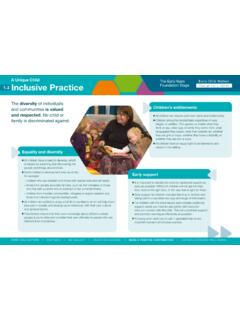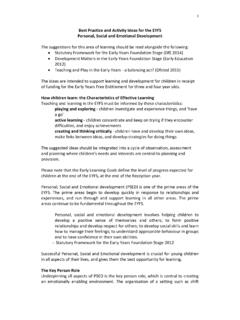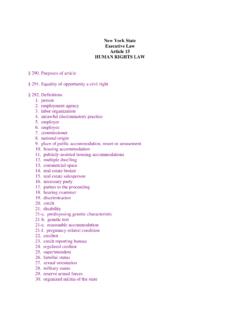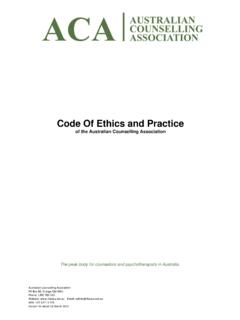Transcription of PCF - British Association of Social Workers
1 PCFP rofessionalCapabilitiesFrameworkStudent to ASYEPCFP rofessionalCapabilitiesFrameworkPoint of entry to training1. PROFESSIONALISM - Identify and behave as a professionalsocial worker, committed to professional developmentSocial Workers are members of an internationally recognised profession. Our title is protected in UK law. We demonstrate professional commitment by taking responsibility for our conduct, practice, self-care and development. We seek and use supervision and other professional support. We promote excellent practice, and challenge circumstances that compromise this. As representatives of the profession, we safeguard its reputation.
2 We are accountable to people using services, the public, employers and the regulator. We take ethical decisions in the context of multiple demonstrate an initial understanding of the role of the Social worker demonstrate motivation and commitment to become a Social worker identify my own potential strengths and challenges in relation to the role of Social worker demonstrate an initial understanding of the importance of personal self-care, resilience and adaptability in Social work demonstrate the ability to take responsibility for my own learning and development. Updated August 201812. VALUES AND ETHICS - Apply Social work ethical principlesand value to guide professional practicesSocial Workers have an obligation to conduct themselves and make decisions in accordance with our Code of Ethics.
3 This includes working in partnership with people who use our services. We promote human rights and Social justice. We develop and maintain our understanding of the value base of our profession throughout our career, its ethical standards and relevant law. recognise the impact my own values and attitudes can have on relationships with others understand the importance of seeking the perspectives and views of service users and carers recognise that Social Workers will need to deal with dilemmas, conflict and use the authority invested in their role. Updated August 201823. DIVERSITY AND EQUALITY - Recognise diversity and applyanti- discriminatory and anti -oppressive principles in practiceSocial Workers understand that diversity characterises and shapes human experience and is critical to the formation of identity.
4 Diversity is multi-dimensional and includes race, disability, class, economic status, age, sexuality, gender (including transgender), faith and belief, and the intersection of these and other characteristics. We understand that because of difference, and perception of difference, a person's life experience may include oppression, marginalisation and alienation as well as privilege, power and acclaim. We identify this and promote equality. demonstrate an initial understanding of difference and diversity within society, the importance of equal opportunities and the implications of this for Social work practice am receptive to the views of others.
5 Updated August 201834. RIGHTS, JUSTICE AND ECONOMIC WELLBEING - Advancehuman rights and promote Social justice and economicwellbeingSocial Workers recognise and promote the fundamental principles of human rights, Social justice and economic wellbeing enshrined in national and international laws, conventions and policies. These principles underpin our practice and we use statutory and case law effectively in our work. We understand and address the effects of oppression, discrimination and poverty. Wherever possible, we work in partnership with people using services, their carers and families, to challenge inequality and injustice, and promote strengths, agency, hope and self-determination.
6 Recognise the contribution of Social work to promoting human rights, Social justice, inclusion and equality am receptive to the idea that there may be ethical dilemmas and conflicts in the Social work role between promoting rights and enforcing responsibilities. Updated August 201845. KNOWLEDGE Develop and apply relevant knowledge fromsocial work practice and research, Social sciences, law, otherprofessional and relevant fields, and from the experience ofpeople who use servicesWe develop our professional knowledge throughout our careers and sustain our curiosity. As a unified profession, we develop core knowledge that relates to our purpose, values and ethics.
7 We also develop specific knowledge needed for fields of practice and roles. Our knowledge comes from Social work practice, theory, law, research, expertise by experience, and from other relevant fields and disciplines. All Social Workers contribute to creating as well as using professional knowledge. We understand our distinctive knowledge complements that of other disciplines to provide effective services. Identify how own learning (formal, informal and experiential) contributes to understanding and developing the Social work role. Updated August 201856. CRITICAL REFLECTION AND ANALYSIS - Apply criticalreflection and analysis to inform and provide a rationale forprofessional decision-makingSocial Workers critically reflect on their practice, use analysis, apply professional judgement and reasoned discernment.
8 We identify, evaluate and integrate multiple sources of knowledge and evidence. We continuously evaluate our impact and benefit to service users. We use supervision and other support to reflect on our work and sustain our practice and wellbeing. We apply our critical reflective skills to the context and conditions under which we practise. Our reflection enables us to challenge ourselves and others, and maintain our professional curiosity, creativity and self-awareness. demonstrate an ability to reflect on and analyse my own experiences (educational, personal, formal and informal) demonstrates curiosity and critical thinking about Social issues.
9 Updated August 201867. SKILLS AND INTERVENTIONS - Use judgement, knowledgeand authority to intervene with individuals, families andcommunities to promote independence, provide support,prevent harm and enable progressSocial Workers engage with individuals, families, and communities, working alongside people to determine their needs and wishes, and what action may be helpful. We build productive working relationships and communicate effectively. Using our professional judgement, we employ appropriate interventions, promoting self-determination, support, protection and positive change. We develop and maintain skills relevant to our roles.
10 We understand and take account of power differentials and use our authority appropriately. We evaluate our own practice and its impact, and how we improve outcomes for those we work with. can communicate clearly, accurately and appropriately to the level of training applied for, in verbal and written forms demonstrate an ability to engage with people with empathy am motivated to develop skills to help people find solutions to Social needs. Updated August 201878. CONTEXTS AND ORGANISATIONS - Engage with, informand adapt to changing organisational contexts, and the socialand policy environments that shape practice.

















